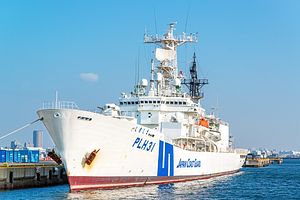As The Diplomat has noted extensively since last week, the Shangri-La Dialogue in Singapore last weekend saw Japan and the U.S. square off against China in asserting their interpretations of recent events in the South China Sea and East China Sea. China’s recent territorial conflicts with Vietnam and the Philippines, and the Japanese government’s attempt to normalize its security role in the region, were the main examples used by the opposing sides to showcase the threat to security posed by their opponent. As the dust begins to settle from the atmospherics over the weekend, Vietnam appears to be the country most interested in aligning with Japan, and willing to increase the scope of their security partnership. Japan is showing itself to be a willing partner, albeit with some important caveats.
As I noted yesterday, Vietnam’s Vice Defense Minister Nguyen Chi Vinh said on Sunday that his country expects to receive coast guard ships from Japan early next year, also stating that Japan had agreed to train and share information with Vietnam’s Coast Guard. He took pains to single out Japan’s support for Vietnam’s current conflict with China, and urged other countries in the region to do the same. For his part, Japanese Prime Minister Shinzo Abe told the Diet last Wednesday that Japan would be unable to “immediately provide decommissioned patrol ships to Vietnam as its own coastguard was stretched by surveillance activities,” according to Reuters. Abe was clearly referring to the ongoing deployment of a large part of the Japanese Coast Guard around the disputed Senkaku/Diaoyu Islands. As a side note, this statement before the Diet was intended to underscore Abe’s current push to reinterpret Article 9 of Japan’s Constitution, which would then create a larger role for the Maritime Self-Defense Forces concerning the disputed islands.
Also on Sunday, Japanese Defense Minister Itsunori Onodera and his Vietnamese counterpart Gen. Phung Quang Thanh agreed to increase their countries’ defense cooperation. The Japan Times reported that Onodera told Thanh “that Japan supports Vietnam’s handling of its recent standoff with China, that the use of force to change the status quo should not be tolerated and that the issue should be resolved through dialogue.” However, the Vietnamese defense minister said the dispute with China over its maritime boundary should be handled peacefully, and in accordance with international law. Both Japan and Vietnam have made constant reference to the use of international law; China is unwilling to take the issue before international arbitration and regards the issue as a historical matter.
However, while Japan and Vietnam appear to be cozying up to each other militarily, the Japanese government announced on Monday that it is suspending new loans to Vietnam following a bribery scandal between a Japanese consulting firm and Vietnam’s railroad authority. The Jiji Press reported that this is the second time Japan has suspended loans to Vietnam because of a payoff scandal, and that fresh loans for Vietnam Railway’s projects will be suspended until next month at the earliest, when the two countries will conduct a panel meeting. The article also stated that Vietnam is the largest recipient of official development assistance from Japan, which at 148.5 billion yen in fiscal 2012 made Japan by far Vietnam’s biggest aid donor.
Japan has made its opinion regarding Chinese assertions in the region clear. Following Lieutenant General Wang Guanzhong’s closing statements at the Shangri-La Dialogue concerning the U.S. and Japan, the Japanese Chief Cabinet Secretary Yoshihide Suga said in Tokyo, “we believe the Chinese senior official made claims based on mistake of facts and defamed our country,” according to an AFP report. He also said that the Japanese delegation at the conference immediately made a “strong protest” against Wang’s remarks.
However, Japan appears to have some reservations about partnering too closely with Vietnam. Certainly, Vietnam’s ongoing spat with China over the deployment of an oil rig in disputed waters makes it one of China’s most belligerent neighbors, and as such a natural ally for Japan, which seeks partners in its efforts to limit what it sees as Chinese aggression in the region. Some of Japan’s trepidation is strictly logistical, and perhaps being played up for domestic consumption. It cannot supply additional coastguard ships to Vietnam if its own territorial waters are being threatened by China. The suspension of aid for Vietnam Railways comes at a crucial time for Vietnam however. As Vietnam’s largest development assistance donor, this is a key avenue for Japan to exert control over Vietnamese behavior. This, combined with the delayed timeline for the delivery of coastguard ships, may be Japan’s way of emphasizing the importance of their relationship, and telling Vietnam to slow the ratcheting of tension with China if possible.
Because, while the eruption of conflict between Vietnam and China might be good for Abe’s agenda of changing Article 9, Japan currently lacks the bandwidth to effectively support Vietnam in a meaningful way. Abe’s current agenda reflects this fact. His final (and largest) set of economic reforms are due to be implemented this month, while any plans to change Japan’s military posture would happen by year’s end at the earliest (and that estimate looks overly optimistic at the moment). Japan’s immediate attention is focused on improving its economy. While Japanese officials may make inflammatory speeches at international conferences, and move to strengthen security ties in the region, fixing the precarious state of Japan’s economy appears to be their first priority.

































